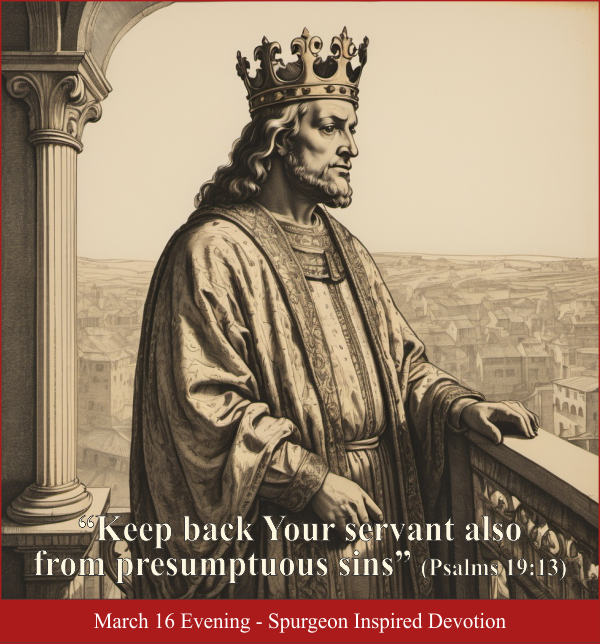
| March 16 Evening Devotion |
|
|
||
“Keep back Your servant also from presumptuous sins” (Psalms 19:13) King David was a man after God's own heart (1 Samuel 13:14), but he was also human. He understood his Old Man would drag him into sin if he let it. Unlike many church-goers who see the anointing of the Holy Spirit as a license to sin (Romans 6:1), he correctly saw God’s anointing as the way to “not walk according to the flesh, but according to the Spirit” (Romans 8:1). If a saint has self-esteem, it should be the result of God-esteem and God-dependence. "He who glories, let him glory in the Lord". The servant of God should be able to honestly say, “we are unprofitable servants. We have done what was our duty to do” (Luke 17:10). The Apostle Paul warns us, “put to death your members which are on the earth: fornication, uncleanness, passion, evil desire, and covetousness, which is idolatry” (Colossians 3:5). What! Do saints need to be warned against these sins? Yes, they do. There’s enough potential sin in your Old Man to make you useless for the Kingdom of God, except as an object lesson of what happens saints who foolishly presume they won’t fall. Who would have dreamed righteous Lot would get drunk and have sex with his daughters? (Genesis 19:35). “Pride goes before destruction, And a haughty spirit before a fall” (Proverbs 16:18). The prophet Elisha wept when God gave him a vision of what a soldier who stood before him was going to do to the people of Israel. The soldier refused to believe it, and said, “what is your servant — a dog, that he should do this gross thing?" (2 Kings 8:13). Yes, he was a dog and did those gross things. “Therefore let him who thinks he stands take heed lest he fall” (1 Corinthians 10:12).
|
 |